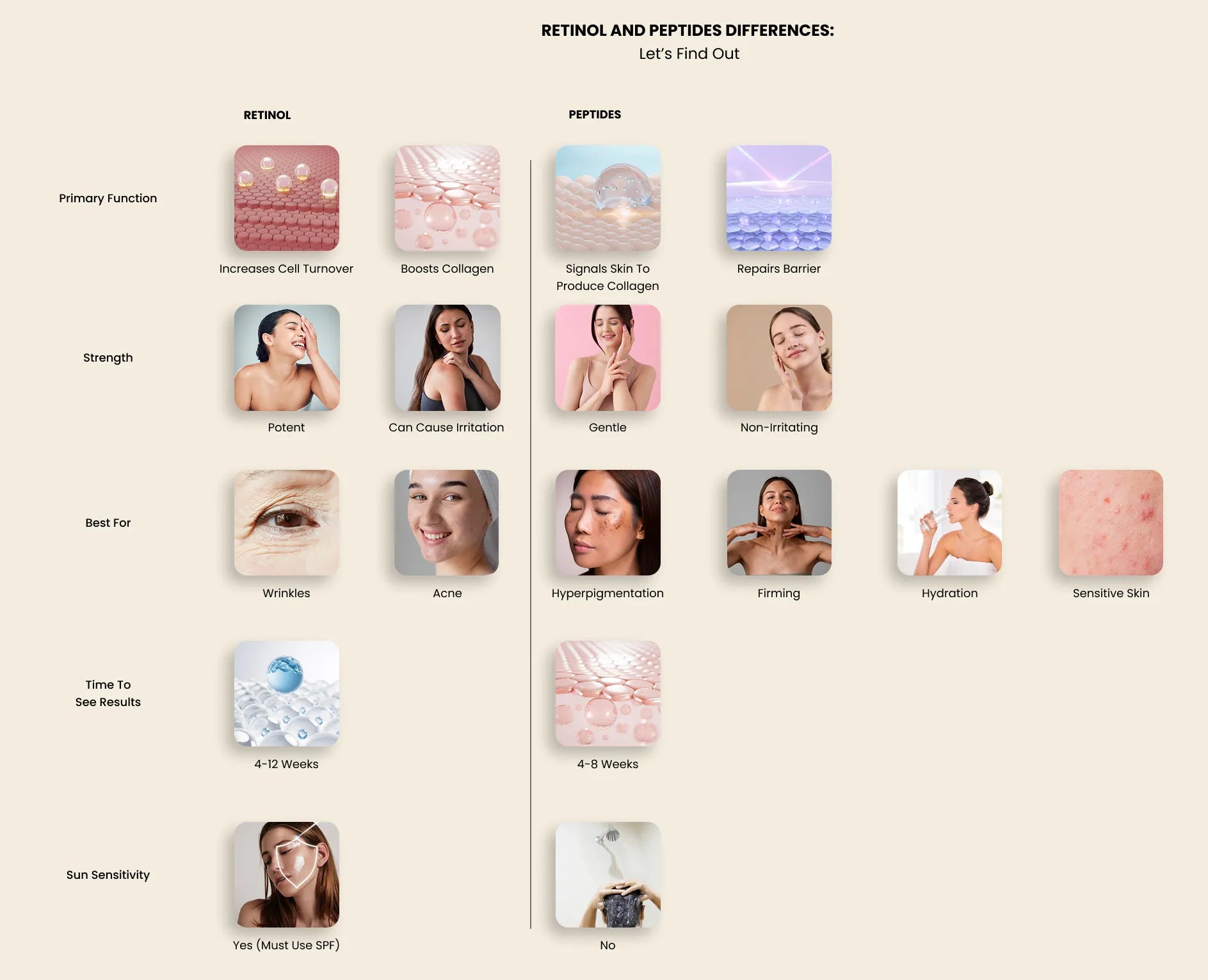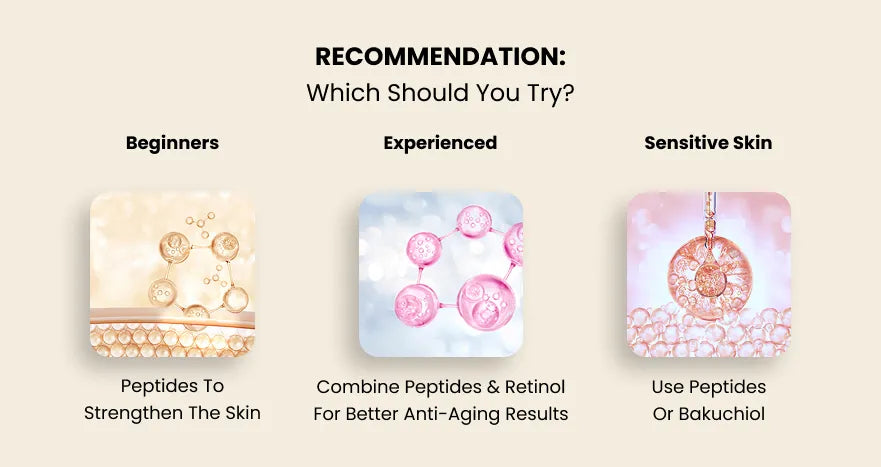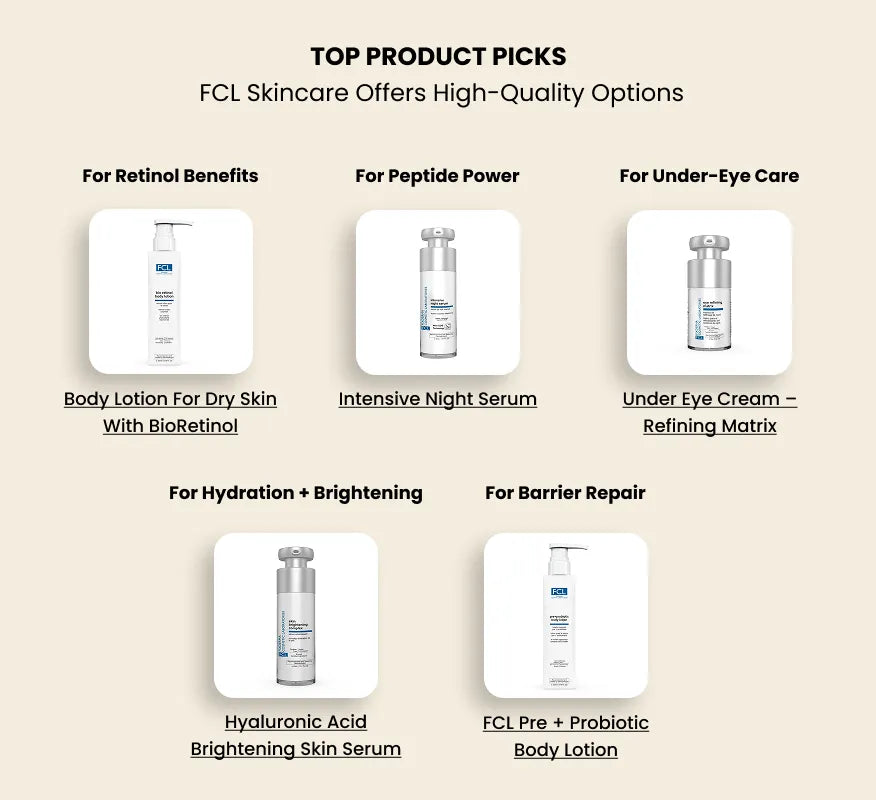Table of Contents
- How does Retinol work on the skin?
- Why should we use Peptides?
- Retinol and Peptides Differences
- Can You Use Peptides with Retinol?
- Retinol or Peptides for Anti-Aging?
- The Future of Retinol and Peptides
- Recommendation: Which Should You Try?
- Top Product Picks
- Final Recommendation: How to Combine Them
- Final Verdict
- FAQs
Selecting between retinol or peptides doesn't need to be confusing. They are both anti-aging, but they work differently. Retinol cream does miracles on wrinkles and acne, whereas peptides are synonymous with strengthening skin barrier and hydration. In this blog we will explore everything about retinol & peptides and help you select the right ingredient for you.

How does Retinol work on the skin?
It is a combination of vitamin A derivative and a gold standard in anti-aging agents. It works by:
- Increasing collagen production (lessening fine lines and wrinkles)
- Increasing the cell number at the surface level (smoother and brighter skin)
- Unclogging pores (helping with acne and texture)
- Fading dark spots (improving skin tone)
Retinol works best when introduced slowly.

Why should we use Peptides?
Peptides are known as short chains of amino acids that work as messengers in the skin. Products of peptides for the skin are important.
The key advantages are:
- It works to stimulate elastin and collagen (for firmer, plumper skin)
- Developing the major skin barriers (improving hydration and resilience)
- Reducing inflammation (helping with redness and sensitivity)
- Supporting wound healing (repairing damage to the skin)
- There are several products of peptides for wrinkles as well.
Unlike retinol, peptides are gentle. It is suitable for all skin types, including sensitive skin.

Retinol and Peptides Differences:
|
Feature |
Retinol |
Peptides |
|
Primary Function |
Increases cell turnover, boosts collagen |
Signals skin to produce collagen, repairs barrier |
|
Strength |
Potent, can cause irritation |
Gentle, non-irritating |
|
Best For |
Wrinkles, acne, hyperpigmentation |
Firming, hydration, sensitive skin |
|
Time to See Results |
4-12 weeks |
4-8 weeks (longer for deep wrinkles) |
|
Sun Sensitivity |
Yes (must use SPF) |
No |

Can You Use Peptides with Retinol?
Yes! Combination of peptides and retinol known as the most effective anti-aging duo:
- For the quick, dramatic type of results pertaining to wrinkles or just texture and even acne, then the option is Retinol.
- If you have sensitive skin or are seeking hydration plus permanent repair, then the option is Peptides.
How to Layer Them
- At Night: Apply peptides first (serum or moisturizer), then retinol.
- Alternate Nights: Use retinol one night, and peptides the next if your skin is sensitive.
- In the Morning: Peptides are safe for daytime use (always follow with SPF).
Retinol or Peptides for Anti-Aging?
- Peptides reinforce the skin barrier and thereby act antagonistically to the effects of retinol upon irritation.
- Collagen is boosted by retinol while peptides support long-term repair.
Best Results? Use both—retinol for active renewal, and peptides for support and repair.
The Future of Retinol and Peptides
- Retinol Alternatives: Newer forms (like retinaldehyde and bakuchiol) offer gentler options.
- Smart Peptides: Research is exploring peptides that target specific skin concerns (like sagging or UV damage).
- Combination Products: More brands are blending retinol and peptides for synergistic effects.

Recommendation: Which Should You Try?
- Beginners: Start with peptides to strengthen the skin before introducing retinol.
- Experienced: Combine peptides and retinol for better anti-aging results.
- Sensitive Skin: Use peptides or bakuchiol in place of retinol.

Top Product Picks
Beginners or almost every brand can include retinol. However, if you're looking for science-backed, effective skincare, FCL Skincare offers high-quality options. For those who are waiting for the science of efficient skin care, FCL Skincare offers the best.
1. For Retinol Benefits
Try FCL’s BioRetinol Body Lotion. It is known as the major product of retinol for beginners.
Body Lotion for Dry Skin with BioRetinol
Why It’s Great:
- Contains BioRetinol (a gentler alternative to traditional retinol)
- Hydrates while improving skin texture and elasticity
- Ideal for dry, aging skin on the body
Best For: Those who want retinol benefits without irritation—perfect for beginners or sensitive skin.
2. For Peptide Power
FCL’s Intensive Night Serum
Why It’s Great:
- Packed with peptides to boost collagen and repair skin
- Lightweight, fast-absorbing formula
- Works overnight for firmer, smoother skin
Best For: Anyone looking for anti-aging without irritation—great for layering with retinol!
3. For Under-Eye Care
Peptide Under Eye Cream – Refining Matrix
Why It’s Great:
- Features peptides and nourishing actives to reduce fine lines and puffiness
- Gentle enough for the delicate eye area
- Helps brighten dark circles
Best For: Those targeting under-eye wrinkles and fatigue without harsh ingredients.
4. For Hydration + Brightening
Hyaluronic Acid + Peptide Serum Hyaluronic Acid Brightening Skin Serum
Why It’s Great:
- Combines hyaluronic acid (hydration) and peptides (repair)
- Enhances glow while plumping fine lines
- Lightweight, perfect under moisturizer or sunscreen
Best For: Boosting moisture and radiance while supporting skin repair.
5. For Barrier Repair:
Pre + Probiotic Body Lotion FCL Pre + Probiotic Body Lotion
Why It’s Great:
- Strengthens the skin barrier with prebiotics and probiotics
- Lightweight yet deeply moisturizing
- Helps soothe irritation and dryness
Best For: Anyone with sensitive or reactive skin needing gentle, restorative care.

Final Recommendation: How to Combine Them
Night Routine
- Peptides first (Intensive Night Serum or Hyaluronic Acid Serum)
- Retinol next (BioRetinol Body Lotion for body, or a facial retinol if using)
Morning Routine
-
Peptides (Eye Cream, Hyaluronic Acid Serum) + SPF (retinol increases sun sensitivity!)
Best Combo for Anti-Aging
- Evening: Intensive Night Serum (peptides) + BioRetinol Body Lotion
- Morning: Hyaluronic Acid Serum + Under Eye Cream
Final Verdict
Retinol and peptides aren’t competitors, they’re essential partners in anti-aging. Retinol delivers dramatic renewal, while peptides provide gentle, sustained repair. For beginners, peptides build resilience; for advanced users, layering both maximizes results.
Whether targeting wrinkles, acne, or sensitivity, the right combination transforms skin safely. Ready to begin? Start with peptides, then add retinol as tolerated. FCL Skincare’s science-backed formulas—like the Intensive Night Serum (peptides) and BioRetinol Lotion (gentle retinol) offer a balanced approach. Always pair with SPF, and introduce slowly.
Visit FCL Skincare for dermatologist-approved solutions. Your best skin starts here!
Explore now & glow up!
FAQs
-
Can Peptides Replace Retinol Completely?
A: No, peptides and retinol work differently.
-
Do Peptides Help with Acne Like Retinol Does?
A: Not directly, but they help in other ways.
-
Can I Use Retinol and Peptides If I Have Rosacea?
A: Proceed with caution. Tip: Patch-test retinol first or opt for bakuchiol (a gentler alternative)
-
Should I Avoid Peptides If I’m Using Retinol for Wrinkles?
A: No! They’re a perfect pair. Just make sure you time them perfectly. Also visit your dermatologist for a better understanding.
-
Do peptides work on body skin like retinol does?
A: Yes, they can. But make sure to use products with good-quality peptides, so they can be effective on your skin.



